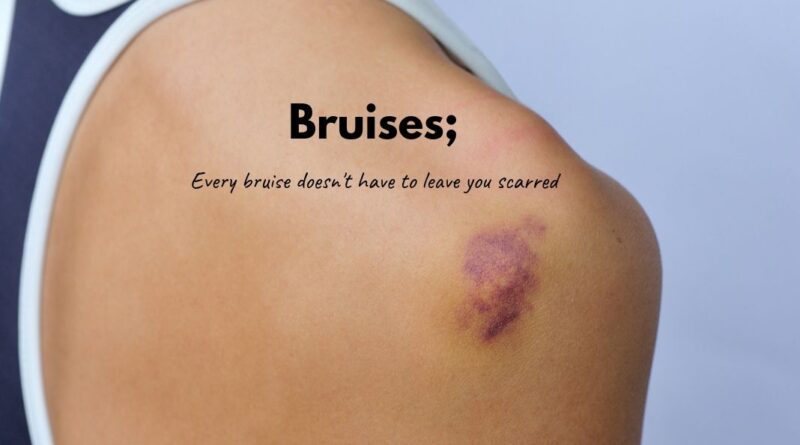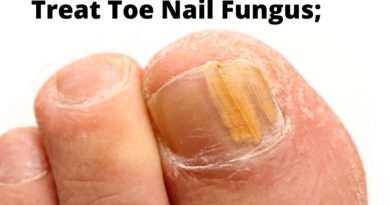How to Get Rid of Bruises Using Natural Remedies
Bruises are the result of injury and trauma to the skin, which results in damage to the blood vessels.
Bruising is a normal response to an injury. Tiny blood vessels beneath the skin get damaged by even a small impact, leaving the blood beneath the skin trapped.
This trapped blood is eventually reabsorbed by the body as the injury heals. In the meantime, the injury can leave a bluish, gray, or purple patch that is tender to the touch.
As most of the damage is beneath the surface of the skin, bruises can be challenging to treat. Bruises usually go away on their own, but you can take steps to lessen the pain and reduce visibility.
However, some home remedies will speed up the healing process and minimize the damage caused.
The following home remedies are safe and may help get rid of bruises faster.
Table of Contents
How to Get rid of Bruises Using Naturopathic Remedies
- Essential Oils
- Home Remedies
- Natural Remedies
- Herbs
- Foods and Supplements
CURE 1: Essential oils for Bruises
Essential oils have potent properties that heal a bruise very quickly. They have antibacterial, antiviral, and antioxidant properties that act wonderfully in healing skin conditions.
1. Tea Tree Oil for bruises

Tea tree essential oil can be applied immediately after an injury occurs or after the recovery process has begun. Tea tree oil is one of the oils that does not have to be diluted before being applied to the bruise. (1)
How to Use?
Rub a few drops onto the skin with a cotton ball since it is not toxic. You can even use it for children as it poses no harm.
How Much to Use?
You can apply this on to the bruise 2 times a day.
Benefits:
Tea tree oil is often listed as the best essential oil for bruises because it has stimulant compounds and antioxidant properties, which can help reduce the discoloration of the bruise.
2. Lavender Essential Oil
This essential oil is well known for being able to cure bruises from deep within. It can also be useful for minimizing the discoloration of the skin after the bruise has healed.
How to Use?
You can apply lavender essential oil directly on the bruise. It is highly effective when applied immediately after the injury happens.
How Much to Use?
Put three to five drops of the undiluted oil directly on the area where the damage occurred to prevent bad bruising and relieve pain.
Benefits:
Lavender essential oil also has anti-inflammatory and astringent properties that keep blood from pooling in the injured area.
3. Rosemary Essential Oil
Rosemary essential oil contains powerful antioxidant and anti-inflammatory properties, which can help manage the body’s immune response to bruising and reduce pain and inflammation. It helps in promoting faster recovery.
How to Use?
Add a few drops of rosemary essential oil to the carrier oil of your choice and apply on the area of the injury.
This oil can also be placed in a warm tub of water. Make sure to submerge the area that has been bruised in the water for the best effect.
How Much to Use?
You can use 3 to 4 drops of this oil blended with a carrier oil like coconut oil and apply on the bruise 2 times a day.
Benefits:
Rosemary essential oil has antiseptic properties which fight and kill the bacteria on the bruise and help in faster healing.
CURE 2: Home Remedies for Bruises
1. Toothpaste for Bruises
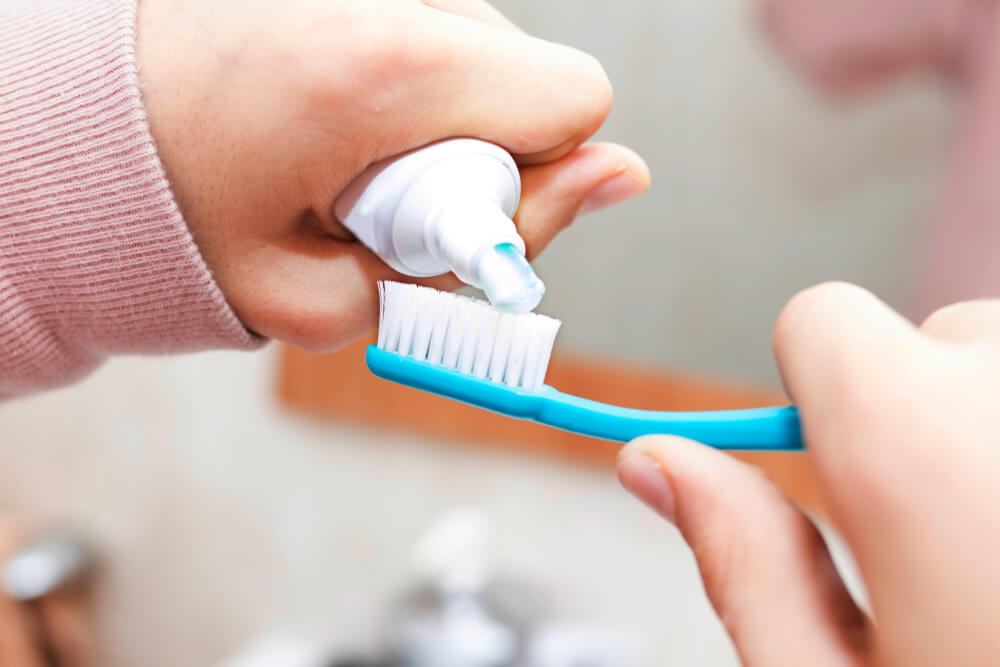
Apart from cleaning your teeth, toothpaste is also used for your skin. Toothpaste helps to treat skin problems like blemishes, acne, dark spots, and wrinkles very effectively.
How to Use?
Ingredients
- Toothpaste (Enough quantity to apply on the bruise)
- Bandage
Procedure
- Apply a dab of toothpaste on the bruise
- Cover the bruise with a bandage to avoid contact with clothes and bedsheets
- Leave it overnight
- Remove the bandage in the morning and wash with water.
How many times:
Do this every night for two to three days.
Benefits:
The toothpaste helps in breaking up the clot and increases blood flow to the bruised area. You will notice considerable healing overnight. It also helps to reduce swelling caused due to bruises.
2. Epsom Salt for bruises
Epsom salt is an effective remedy for treating bruises. When Epsom salt is absorbed through the skin, it draws toxins from the body, sedates the nervous system, reduces swelling, relaxes muscles. It is a natural emollient and exfoliator.
How to Use?
Ingredients
- 1 cup of Epsom salt
- One mug of lukewarm water
- 1 clean and dry cotton ball
Procedure
- Add 1 cup of Epsom salt to a mug of lukewarm water
- Dip a cotton ball in it.
- Remove the excess water from the cotton
- Rub the cotton ball against the bruise gently
How many times:
Do this every 3 to 3 hours a day.
Benefits:
Epsom salt helps relax the muscle tissue and reduce swelling. It is easily absorbed into the body, where it reaches the damaged tissue and relieves pain, inflammation, and soreness.
3. Ice or heat for bruises
Ice therapy
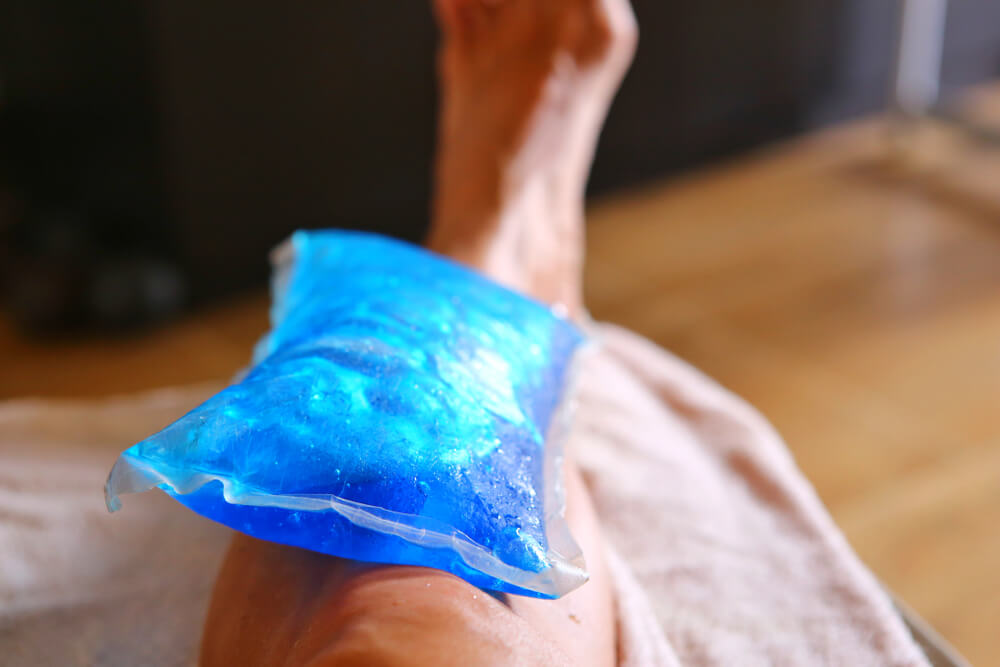
Applying ice immediately after a bruise helps in reducing the blood flow around the area. Cooling the blood vessels with an ice cube reduces the amount of blood that leaks into the surrounding tissue. This can prevent further damage and also reduces swelling.
How to Use?
You can use a bag of ice, a reusable ice pack, a bag of frozen vegetables wrapped in a cloth or a towel.
How Much to Use?
Ice the bruise for 10 minutes at a time. Wait 20 minutes before reapplying.
Heat
You can apply heat to increase blood flow and boost circulation. This will help to clear away the trapped blood, which is the result of a bruise. Applying heat can also help to relieve pain and loosen tensed muscles.
How to Use?
You can use a hot water bottle or a heating pad. Soaking in a hot bath is another option.
How Much to Use?
Heat application can be done from 5 to 10 minutes. If you feel that the muscles around the bruise have limited movement, apply heat to relieve the pain and inflammation.
CURE 3: Natural Remedies for Bruises
1. Parsley and Coconut Oil for Bruises
Parsley is a herb that has anti-inflammatory and pain reducing properties. Coconut oil promotes the lymphatic process of your body, which speeds up the healing process.
How to Use?
Ingredients
- 1/2 cup of fresh parsley leaves
- 2 tablespoons of coconut oil
- A small bowl to mix
- A clean bandage
Procedure
- Crush some fresh parsley leaves into a paste
- Transfer this into a small bowl
- Add 2 tablespoons of coconut oil to it
- Give it a nice mix
Apply this mixture directly on to the bruise and cover it with a bandage. Let it stay overnight. Remove the bandage the next morning and clean the bruise with warm water. Apply the mixture again in the morning and cover the bruise with another clean bandage.
Also Read: 13 benefits of coconut oil for babies
Benefits:
Coconut oil is one of the best remedies for treating bruises. It also boosts your immunity. Topical application of coconut oil heals bruises faster. Also, Parsley is high in Vitamin K, which is a natural anticoagulant. This helps in clotting of blood and prevent further damage.
2. Apple Cider Vinegar for Bruises
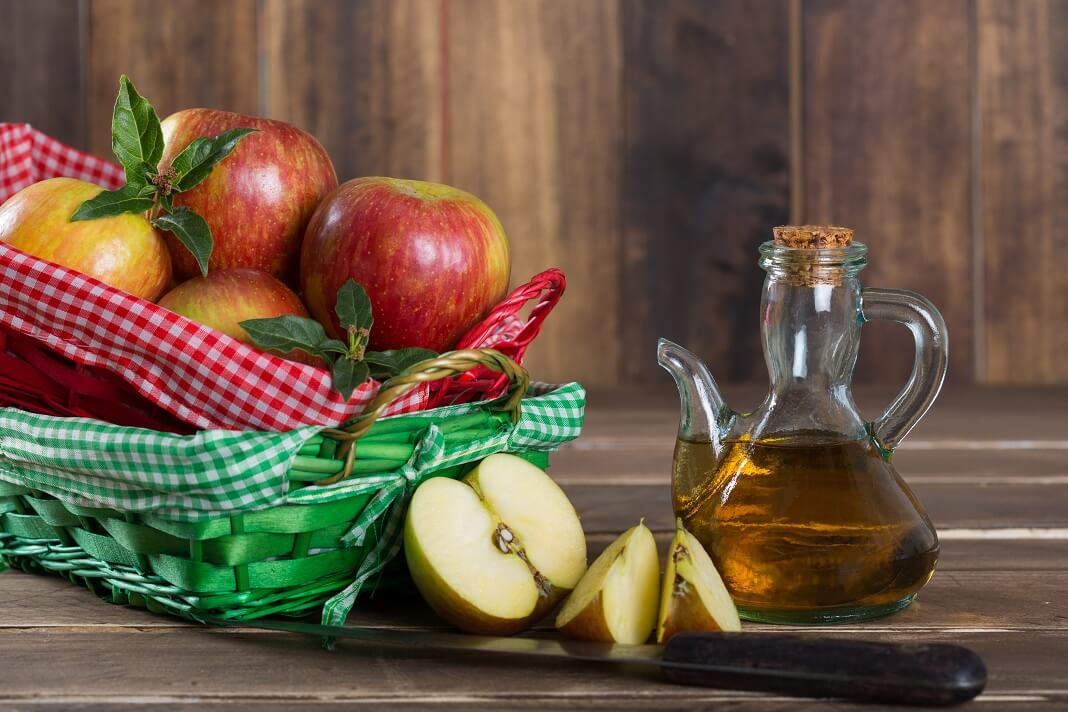
Apple cider vinegar has anti-inflammatory properties. It helps in reducing inflammation, swelling, and pain caused because of a bruise.
How to Use?
Ingredients
- 10 to 12 drops of apple cider vinegar
- 1/2 cup of warm water
- A clean and dry cotton ball
Procedure
- Take half a cup of warm water
- Add 10 to 12 drops of apple cider vinegar to it
- Dip the cotton ball in this mixture
- Apply it against the bruise very gently.
How many times:
Repeat this twice a day for five to six days.
Benefits:
The mixture of vinegar and warm water rubbed on the bruise increases the blood flow to the skin’s surface and promotes faster healing.
3. Ginger for Bruises
Ginger is another herb that works wonders for treating various skin problems. It has antibacterial and anti-inflammatory properties that speed up the healing process of bruises.
How to Use?
Ingredients
- A small piece of ginger (About 1 inch)
- A soft cloth or a plaster
Procedure
- Wash the ginger thoroughly
- Crush it and make a paste of it
- Apply topically on the swollen surface.
- Cover it with a plaster. or a bandage
- Leave it overnight. and wash with clean water the next morning
- How many times:
- Repeat this for a day or two.
Benefits:
Ginger has a beautiful effect on our skin due to its potent anti-inflammatory and antioxidant properties. It can fight the bacteria, causing infection, and helps in healing the wound faster.
CURE 4: Herbs for Bruises
1. Witch hazel
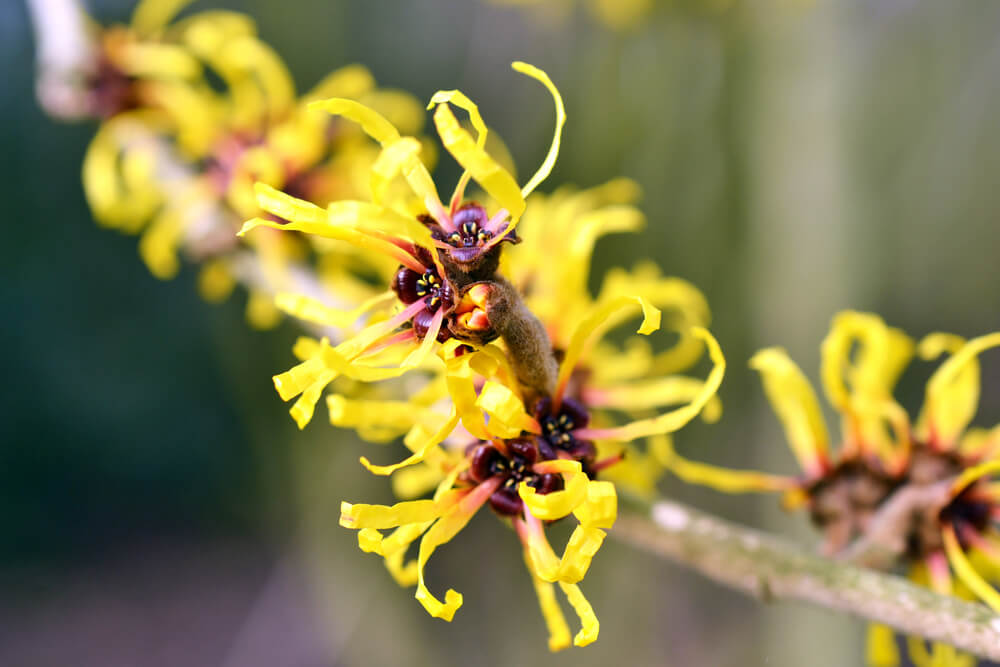
Witch hazel tones and tightens the tissues as it has potent astringent properties. Applying it directly to a bruise will help keep the area drained and lessen discoloration.
How to Use?
Soak a clean and dry cotton ball in witch hazel and apply it gently against the injury. After this, use an ice pack on the injury for more effectiveness.
How Much to Use?
You can do this 4 to 5 times a day.
Benefits:
Witch hazel contracts body tissues and reduces bleeding. This makes the bruises fade faster and even help heal the underlying damage.
Also Read: Benefits and Uses of Witch Hazel Water
2. Comfrey
Comfrey has potent skin healing properties that make it a potent ingredient of various herbal medicines. It has strong regenerative properties that it evens heals broken bones.
How to Use?
Using it as a tincture or a salve on bruises to accelerate the healing, bring down inflammation, and help in draining stagnant fluids.
How many times:
Apply it to the bruise twice a day for best results.
Benefits:
Comfrey has anti-inflammatory properties that decrease bruising when the herb is applied topically. It also decreases inflammation and stops bleeding.
3. Cayenne Pepper
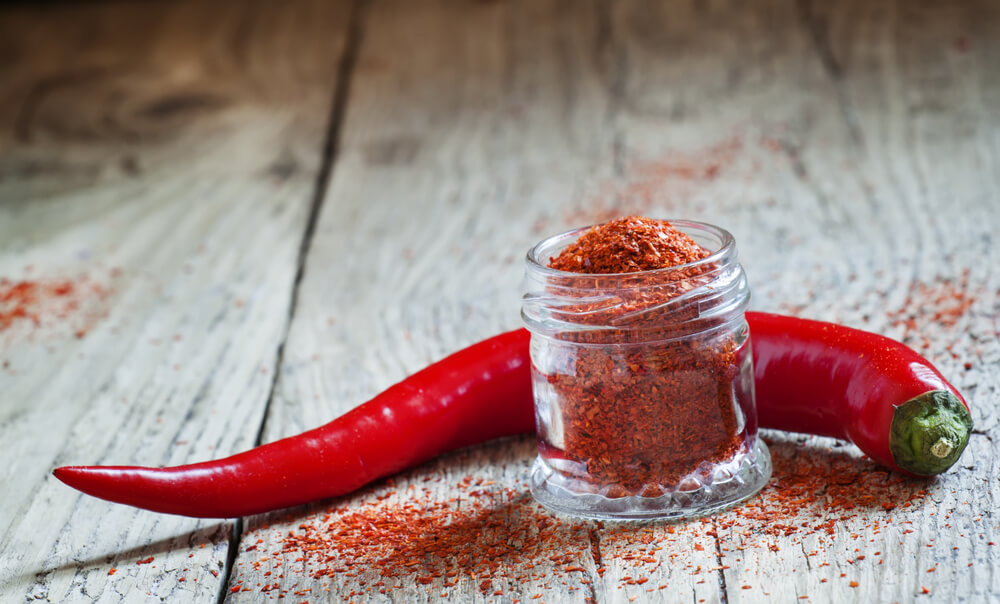
Cayenne Pepper treats tender bruises very effectively.
How to Use?
add a pinch of cayenne pepper to a tablespoon of Aloe Vera gel or ointment and mix thoroughly. Apply it gently to the bruise. Let the mixture be absorbed. You can cover the area with a bandage
How many times:
Apply this mixture just before going to bed and let it stay overnight. Wash it with cold, clean water the next morning.
Benefits:
Cayenne is a fantastic pain reliever and anti-inflammatory. It’s warming properties will also help drain fluid from the bruise and promote faster healing.
CURE 5: Foods and Supplements for Bruises
Vitamins for Bruises
1. Vitamin C
Eating foods that are rich in vitamin C help in improving the body’s response to a bruise. Vitamin C is known for healing wounds and repairing tissues. The human body requires regular replenishment of this vitamin from the foods we eat.
How Much to Use?
The recommended dietary allowance is 90 milligrams for men and 75 milligrams for women.
What to consider:
Eating a balanced diet is probably a straightforward way of adding vitamin C to your body. Prepare and eat a salad with spinach and red or green peppers, drink an occasional glass of low-sodium tomato juice, snack on fresh pineapple, cantaloupe or watermelon or drink unsweetened vitamin C-fortified beverages.
2. Vitamin K
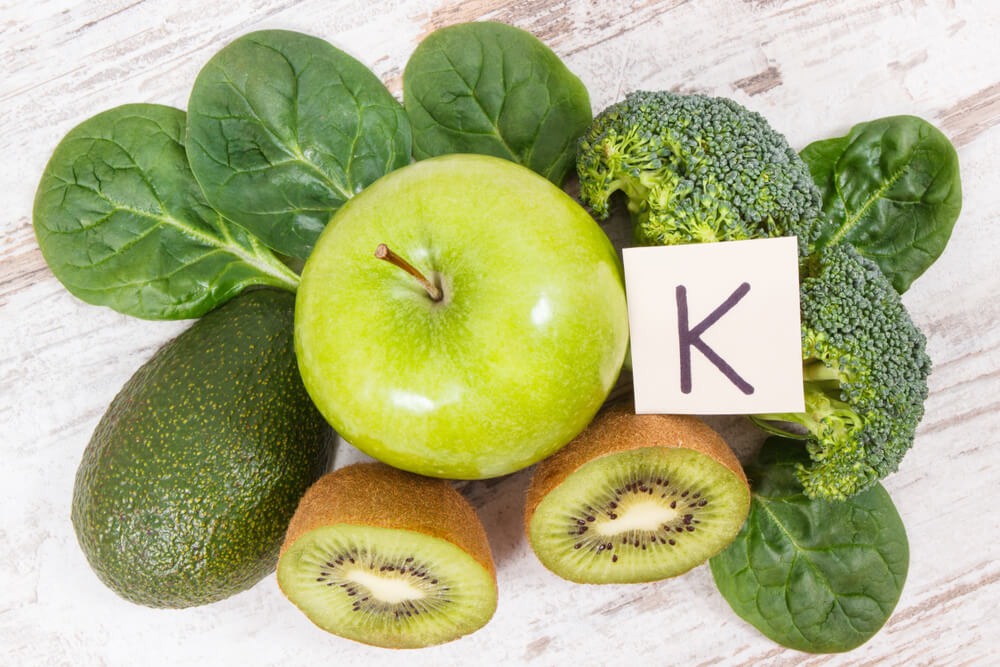
Vitamin K is a second nutrient needed for healing bruises. A deficiency in vitamin K can result in slow blood clotting and cause you to bruise more easily. To promote healthy blood clotting,
How Much to Use?
The average intake of vitamin K for adults ranges from 90 to 120 micrograms per day.
What to consider:
Main sources of vitamin K are leafy greens and small amounts of oils. Eat salads with kale and spinach, add Swiss chard or broccoli to soups or pasta, and cook with canola or olive oil.
3. Folate
Folate supports the faster recovery of bruises. Folic acid is the synthetic form of folate taken as a supplement. Since this nutrient is necessary for cell division and other processes, regular intake of folate helps your body to heal after getting a bruise.
How Much to Use?
The folate intake is 400 micrograms per day for individuals who are aged 14 and older.
What to consider:
Choosing a diet with vegetables and fruits, legumes, folic acid-fortified foods, and nuts can help meet your daily intake of folate. Consume soups with spinach and dried beans or peas, select bananas or oranges as snacks or consume pasta or fortified bread as a part of your meal.
How can you prevent bruises?
Although it is challenging to prevent bruises completely, you can at least reduce the risk of bruises happening to you.
- Wear protective equipment like helmets when riding a motorcycle or playing contact sports
- Keep walkways and floors clear of obstructions that might cause you to slip and fall.
- Keep furniture away from walkways and doorways so that you don’t bump into it.
- When walking through dark or poorly lit areas carry a torchlight to reduce the risk of accidental falls.
- Keep a night light switched on in your room in case you need to get up in the middle of the night to go to the kitchen or bathroom.
- Make sure your diet contains adequate amounts of vitamins like B12, C, and K, and folic acid.
- Most bruises are harmless, and there are various home remedies to treat them and reduce their appearance and help them heal faster.
All the remedies mentioned above are safe to try but do not take oral supplements for treating bruises without talking to a healthcare professional.
Also Read: Top Healthiest Fruits for Health and Skin
FAQs
1. How long should bruises last?
Bruises usually fade away in about 2 weeks. During this time, the bruise changes color as the body breaks down and reabsorbs the blood.
2. What if a bruise doesn’t go away?
If a bruise does not heal within three to four weeks, or if it swells or becomes more painful, you likely have a hematoma (blood collecting under the skin). A doctor can drain the hematoma.
3. Can a bruise be dangerous?
Severe bruising can be dangerous and can lead to severe complications. Further excess fluid and bleeding may accumulate, causing a hard, fluctuating lump or swelling hematoma. This can cause compartment syndrome in which the swelling completely stops the blood flow to the tissues.

